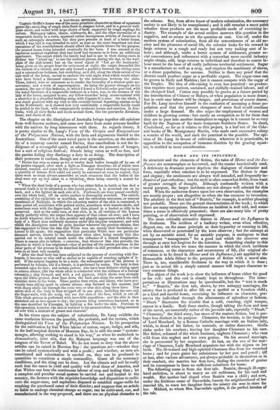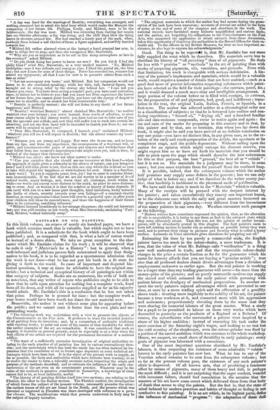HOME AND ITS INFLUENCE.
IN structure and the elements of fiction, the tales of Home and its In- jluenee are commonplace or borrowed, and the matter inartistically wed. A deficiency in dramatic power deprives the dialogues of character and
force, especially when emotion is to be expressed. The diction is clear and elegant; the sentiments are always well intended, and frequently in- dicative of just reflection; but the style is often somewhat feeble, from want
of greater strength of thought. Although confessedly written with a moral purpose, the larger incidents are not always well selected for this
end. When the authoress draws upon her own observation, the examples
are mostly proper • not altogether so when she has recourse to invention. The adultery in the first tale of "Beatrix," for example, is neither pleasing nor probable. These are the general characteristics of the book; to which there are many exceptions. Sometimes an incident is well told, and some- times a scene is effectively presented ; there are also many bits of pretty painting, or of observation well expressed. The most critically attractive feature in Home and its Influence is its freshness. The artifices of a hackney writer, even when effective,
disgust one, on the same principle as does hypocrisy or cunning in life, when discovered or penetrated by the keen observer ; but the attempt at art by an amiable mind, for an amiable purpose, is analogous to that transparent " management " for a good end which the observer sees through at once but forgives for the intention. Something similar to this sentiment is felt when we trace the manner in which the stock incidents of romances, or the characters and occurrences of life, (for original ob-
servation is to be found in Home and its Iryluence,) are applied by the Honourable Adele Sidney to the purposes of fiction with a moral aim.
There is, too, considerable freshness in the way in which it is done; just as in actual life a simply natural manner will impart character to very common things.
The object of the work is to show the influence of home either for good or for evil : and this end is closely kept to throughout. The inter- pretations or illustrations may be questionable, but the "text is stuck to." "Beatrix," the first tale, shows, by two unhappy marriages, the misery that is produced in after life on a spoiled or a forsaken child; as a kind and careful home, exercising its influence on character, pre- serves the individual through the allurements of splendour or fa:shion..
" Dinah " illustrates the trouble that a cold, exacting, rigid temper,. causes in a family. Both these stories, though taking the form and tone of the novel, are essentially rather of the juvenile tale, especially "Dinah.' "Clemence," the third story, has more of the mature fiction, but is per- haps less distinct in its purpose. Clemence, the heroine, is the daughter of Lord Moorland, by a Roman Catholic marriage with an Italian lady, which, in dread of his father, he conceals, or rather disavows. Giulia sinks under his conduct; leaving her daughter Clemence to his care. Her father, ashamed of the whole business, neglects Clemence ; who runs
wild from this neglect and her own genius. On his second marriage, she is persecuted by her stepmother. At last, on the eve of the mar-
riage of Clemence, Lady Moorland acquaints her with the stigma on her birth. The ill-trained and high-spirited Clemence flies from her wretched home ; and for years gains her subsistence by her pen and pencil ; tilt at last, after various adventures, not always probable in themselves or in their conduct, she marries her first love, finding the exercise of genius and its recompense in fame no sufficient substitute for home.
The following scene is from the first tale. Beatrix, through ill-regu- lated ambition, is about to marry an old nobleman, for his rank and wealth. Her mother had eloped when Beatrix was a child ; and now, under the fictitious name of Stavordale, haunts the neighbourhood of her married life, to warn her daughter from the misery she sees in store for her. Mildred, to whom Mrs. Stavordale applies, is the perfect heroine of
the tale.
"A day was fixed for the marriage of Beatrix ; everything was arranged, and nothing remained but to await the fatal hour which would make the Marquis the companion of her future life. Philippa, Emily, and Mildred, were to be the bridesmaids: the day was near. Mildred was returning from visiting her cousin rate one October afternoon; a fog was rising, and the chill blast blew the dying leaves in showers around her. She had reached a lonely part of the park, when, suddenly from behind a tall thicket of fame, a figure appealed, and swiftly harried towards her.
"Mildred felt rather alarmed when at the instant a hand grasped her arm, in order to oblige her to stop; and then she recognized Mrs. Stavordale. Why are you so imprudent as to be out in this damp atmosphere so late in the evening?' asked Mildred.
"` Do you think damp has power to harm me now? Do you think I feel the chilly blast?' cried Mrs. Stavordale, in a very excited manner. 'No, Mildred Godolphin: once I was delicate and young as you ; I liked the genial air, the blue sky; but now I care for none of these things. Fever has scorched me, remorse has seared my enjoyment; all that I care for now is to preserve others from such a fate as mine:
"'Let me accompany you home,' said Mildred. But her companion would not listen to it: she continued speaking; while her thin, tall, funereal figure, was brought out in strong relief by the stormy sky behind her. I can tell you whence you come. You have been acting a cousin's part; you have used entreaties, tears, to induce her to listen to you: but you know not from experience the horror of her future fate; you cannot paint forcibly, you have not the energy of despair to cause her to shudder, and to match her from irretrievable ruin.' " Beatrix is perfectly content: she will not listen to any doubt of her future happiness,' said Mildred. " Beatrix ! wretched Beatrix !' almost shrieked Mrs. Stavordale: 'no mother watched over your infancy; you never learned, from words of affection, to steer your course aright in this stormy world : you have had no one to take care of you but the ignorant and selfish; and now they will suffer you to rush into certain de- struction, and not one firm band will be extended to snatch you from it; not one nerve will be strained to save you! "'Dear Mrs. Stavordale, be composed, I beseech you!' exclaimed Mildred: whatever you tell me I will repeat to Beatrix ; but she almost resents my inter- ference !'
Because you are young and happy. But were she to see me, and to learn from my bps, and from my experience, the consequences of a wayward will, of pride, and resentment—the years of misery and remorse and wretchedness that may follow from one moment's iinprudence—she might even yet, and in time, be warned of the danger that threatens her.'
"Mildred was silent: she knew not what answer to make.
" Can you contrive that she should we me tomorrow at this hour ?—when the approach of night gives a solemnity to the silence of nature, can you bring her here? and I will then prove to her, that on this one step which she is about so soon to take will depend her happiness or wretchedness for ever. Home is a familiar, a holy word I To you it suggests peace, love, joy ! but to some it contains bitter- ness unmentionable. If we feel that we are not worthy to be a member of it—if unkind words, angry feelings, and, worse than all, contempt, dwell within its walls—no words can convey more distress to the mind, no place be more distress- ing to enter. And on woman it is that the comfort or misery of home depends. If you carry with you to a new home pure thoughts, kind intentions, lenity towards the faults of others, severity towards your own failings—if a constant charity breathes in every expression—that home will ever be a peaceful spot: in after years your children will bless its remembrance, and trace the happiness of their future fives in its endearing, ennobling, influence.'
"Mildred listened breathlessly to her strange eloquence: she could not interrupt her; and was still musing on her words, when Mrs. Stavordale, exclaiming Fare- well, Mildred,' walked hurriedly away."



























 Previous page
Previous page